7 Benefits of AI in HR – Finding Talent Through Technology
According to a Career Builder Survey, 93% of organizations report time savings and efficiency through integrating AI into their HR practices. Moreover, around 67% indicate tangible cost and resource savings. These numbers are a testament to the transformative power of AI in HR, reshaping traditional talent acquisition processes.
From revolutionizing hiring decisions to fostering a culture of continuous improvement, AI has offered unparalleled benefits for organizations and employees.
Thinking about integrating AI into your hiring processes, here are the benefits of doing so with relevant case studies:
1. Improved Hiring Decisions
With the influx of applications flooding in for global positions, companies face the challenge of streamlining their recruitment processes. However, with the integration of AI into HR practices, the hiring process has become remarkably efficient.
Here are the AI methods people in HR are using effectively:
- Automated Resume Parsing: Applicant tracking systems (ATS) analyze resumes in seconds, identifying key qualifications, skills, and experience levels.
- Predictive Analytics: Algorithms assess candidate profiles, social media presence, and behavioral patterns to predict job performance and cultural fit.
Here’s how Unilever, a global consumer goods company, integrated AI into their HR processes, and it was an absolute success:
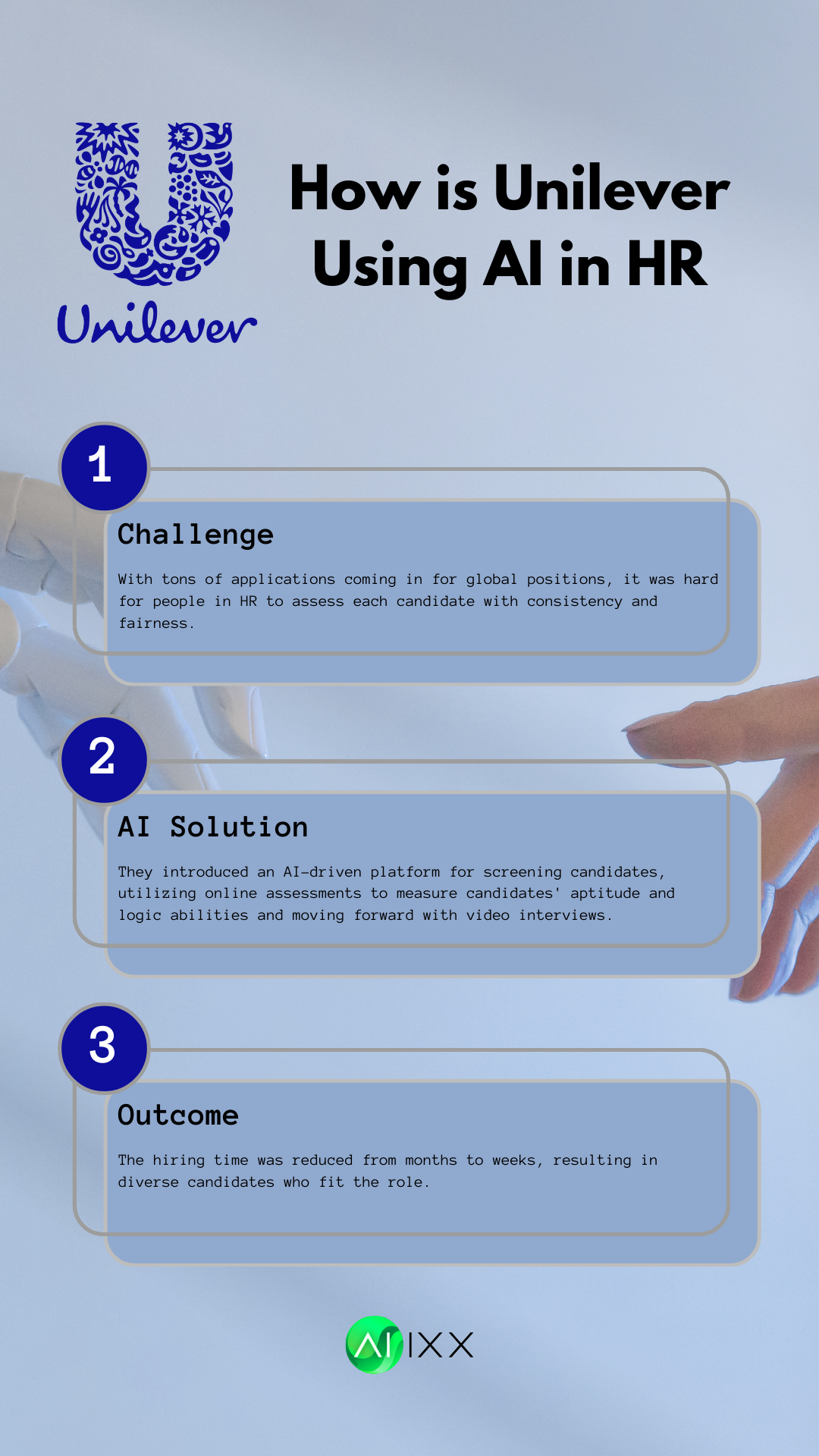
2. Enhanced Employee Experience
Organizations have unlocked new avenues to personalize the employee's journey using AI. AI has helped them foster deeper connections and cultivate a culture of empowerment.
- AI-driven Onboarding: Chatbots can provide relevant information about company policies and answer common queries, creating a tailored onboarding experience for each employee.
- Continuous Learning and Development: AI can recommend personalized training programs and resources for each employee by analyzing their skill sets, interests, and career aspirations.
- Real-time Feedback: By analyzing sentiment and engagement levels, AI can identify areas of improvement and highlight achievements, fostering a culture of continuous feedback and appreciation.
Let’s have a look at how IBM Watson used AI for employee engagement and improved their experience at the organization:
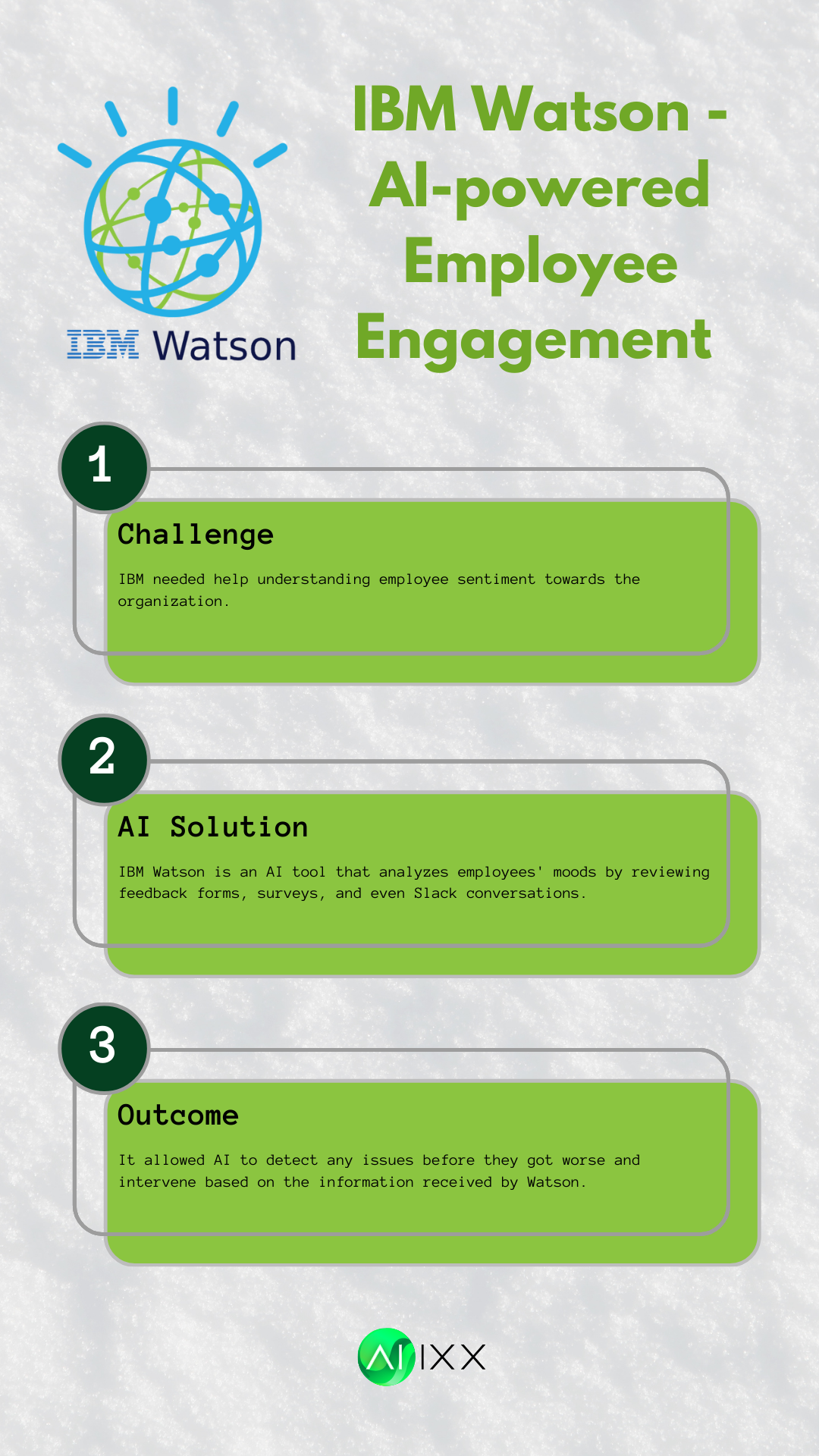
3. Efficiency in HR Processes
AI-powered tools streamline routine administrative tasks such as interview scheduling, follow-up emails, and processing paperwork. By automating these repetitive processes, HR professionals can focus their time and energy on more strategic initiatives, boosting overall productivity.
AI algorithms analyze vast pools of data to accurately identify the best-fit candidates for specific roles. This accelerates the recruitment process and gives companies a competitive edge by allowing them to hire the best talent faster.
Here’s how TIGI HR, a recruitment agency, used AI to change their HR processes:
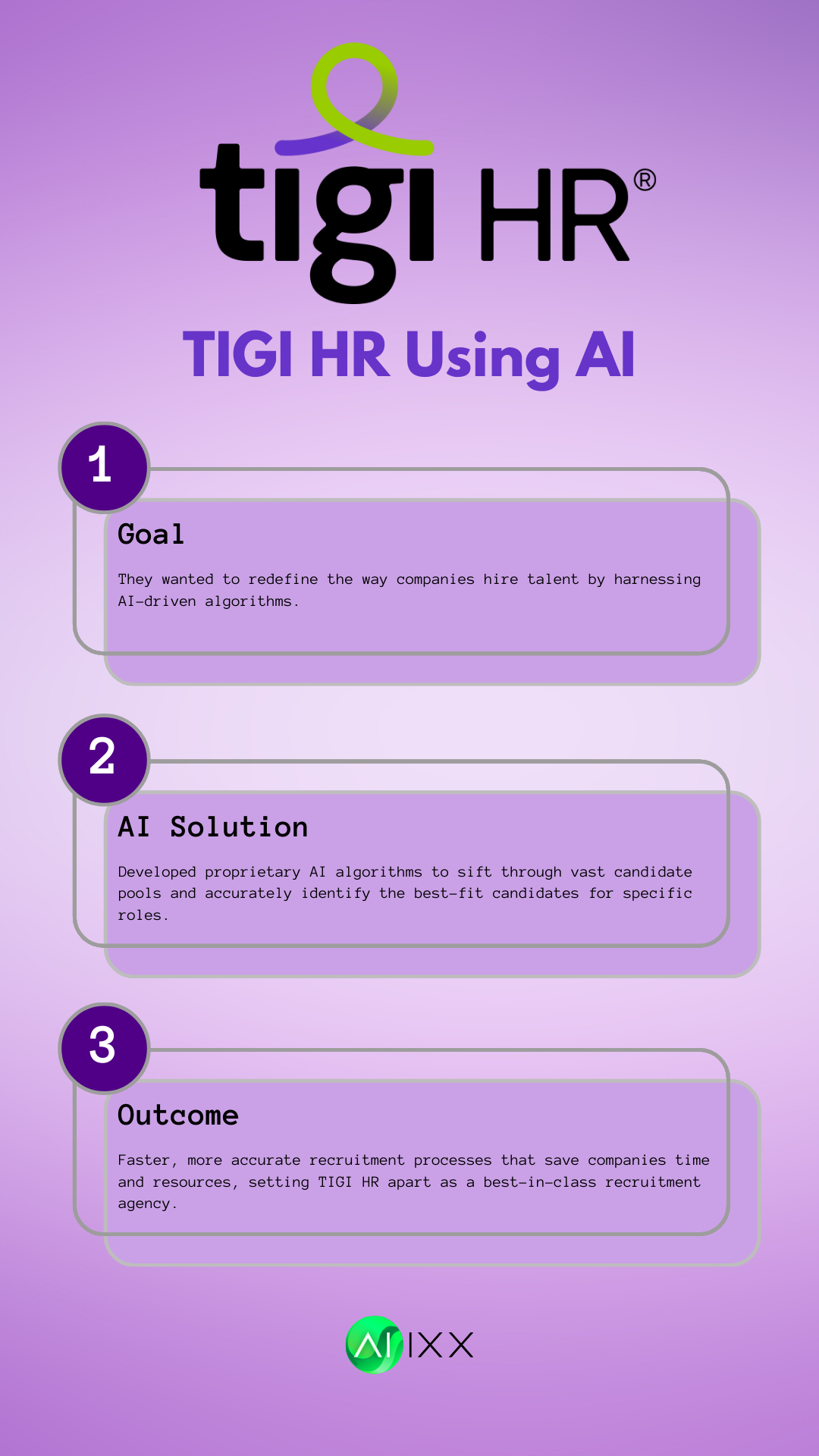
4. Data-Driven Insights
With predictive analytics, AI analyzes datasets to identify patterns and trends, enabling HR professionals to predict future outcomes and anticipate workforce needs. This way, organizations can proactively address problems such as talent shortages, turnover rates, and skills gaps, ensuring long-term success.
Performance management AI tools evaluate employee performance against many factors in real time. This provides HR departments with insights into individual and team performance.
ADP, a global HR management software and service provider, leveraged AI to provide deeper insights into employee performance:
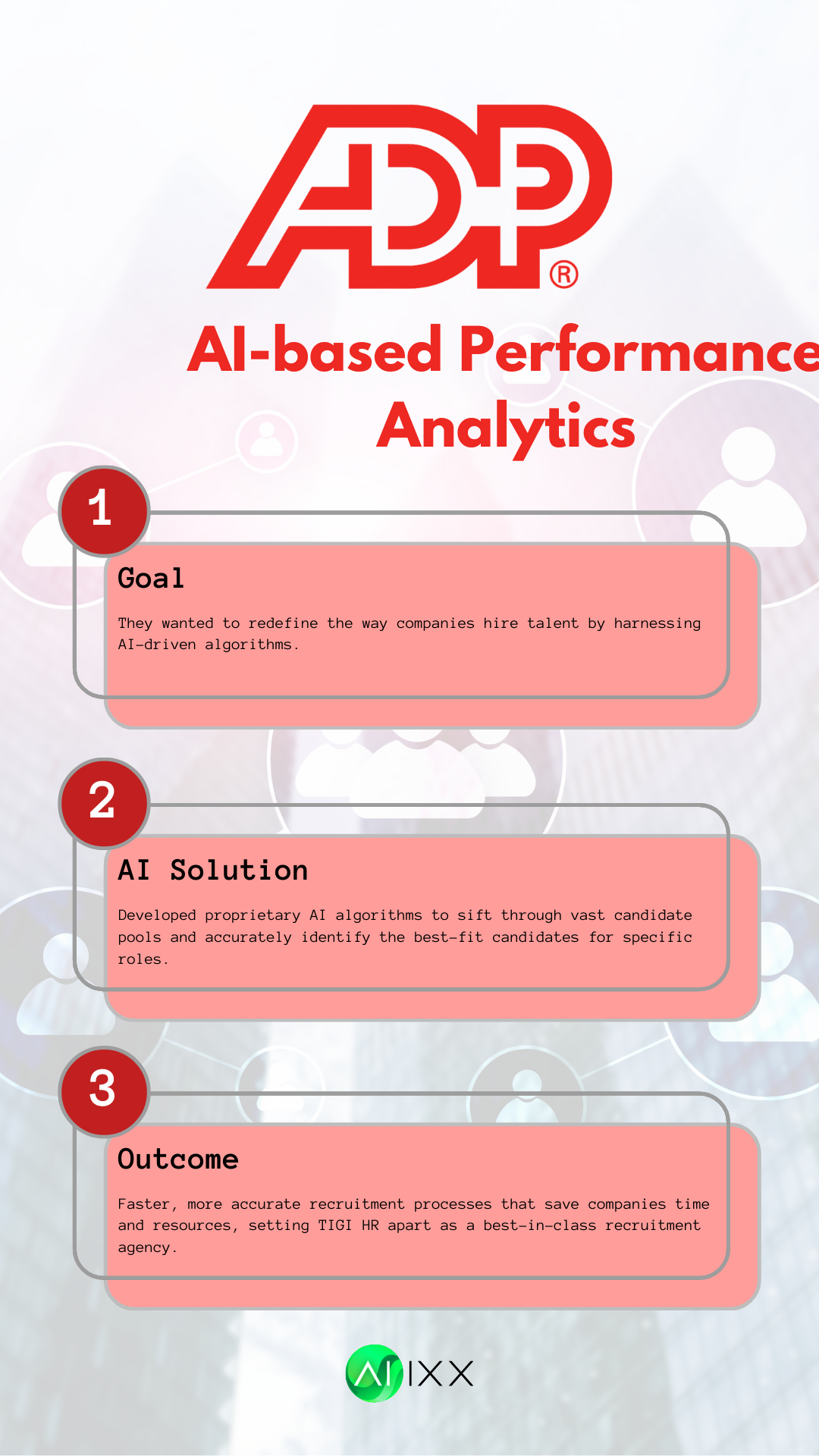
5. Bias Reduction in Hiring
Traditional candidate assessment methods are susceptible to biases, which can impact hiring decisions. However, with the advent of AI, organizations have a powerful tool to minimize prejudice and foster equitable hiring.
Here is how a fair and equitable hiring process can benefit you and your organization:
- 86% of job applicants consider a diverse and inclusive workforce crucial when selecting an employer.
- It helps promote diversity and inclusion in the workplace.
- The AI-driven processes enhance decision-making accuracy.
- Reduced bias builds the employer's brand reputation as an inclusive workplace.
- It helps realize potential talent who possess unique skills.
6. Boosting Employee Retention
High turnover rates disrupt an organization's workflow and productivity. Weak employee retention creates an extra cost associated with recruiting and training new employees.
Fortunately, organizations can proactively identify at-risk employees and implement retention strategies to mitigate turnover using AI.
Here’s how AI can help with employee retention:
- Identifying Early Warning Signs: AI algorithms analyze performance metrics, engagement levels, and historical patterns to identify subtle indicators of employee dissatisfaction. Thus, organizations can intervene before issues escalate.
- Personalized Retention Strategies: AI can design personalized interventions, such as career development opportunities, flexible work arrangements, or mentorship programs, to improve retention rates.
- Real-time Monitoring: By tracking employee satisfaction levels and gathering feedback, organizations can identify areas for improvement and take proactive measures to address concerns.
- Strategic Succession Planning: AI identifies high-potential employees and develops personalized career paths for succession candidates to nurture talent internally.
7. Tailored Learning and Development
Personalized learning experiences foster greater employee engagement and satisfaction, leading to higher retention rates and increased loyalty to the organization.
By recommending courses, webinars, and workshops based on an individual's job role, past training, and interest, AI enables employees to acquire skills directly applicable to their current role and future career aspirations.
These tailored learning and development programs enable employees to develop skills essential for their roles, leading to increased productivity and organizational success.
Here’s how Accenture integrated AI into its HR practices:
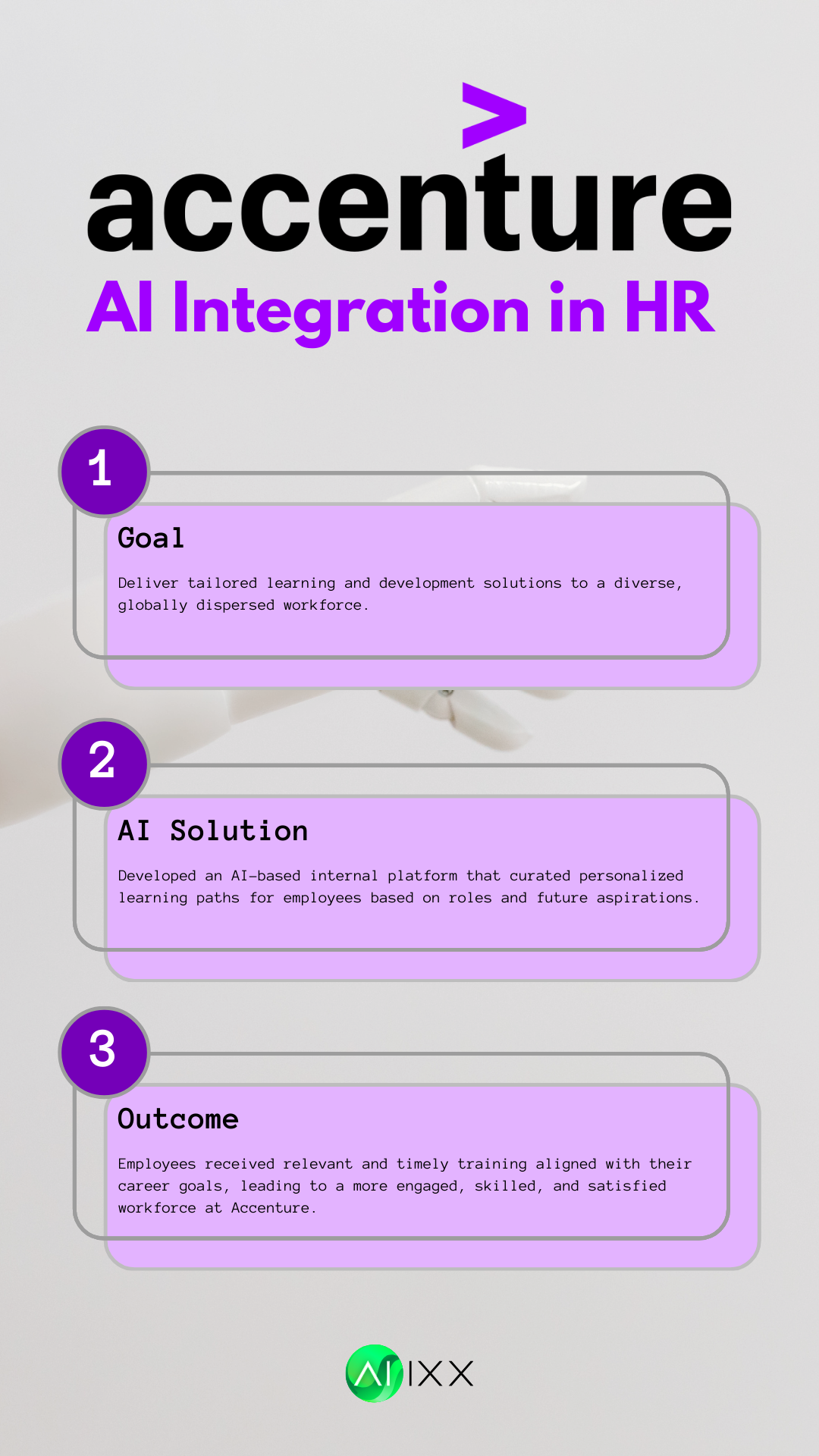
The Future of AI in HR
AI will continue to shape HR by offering advanced decision support systems and personalized employee experiences. Virtual HR assistants will streamline administrative tasks, while AI-powered analytics will provide insights for strategic initiatives.
AI's evolving role will become a strategic partner, driving decision-making that is aligned with business objectives. Additionally, AI will foster inclusive cultures and require HR professionals to adapt continuously to new technologies. Embracing AI in HR promises efficiency, innovation, and inclusivity in the future workplace.





